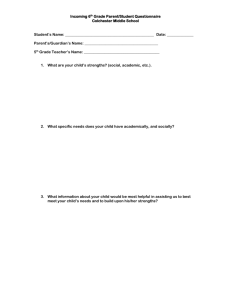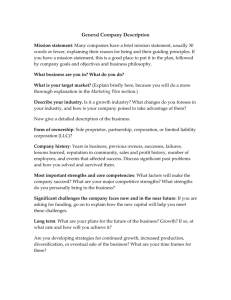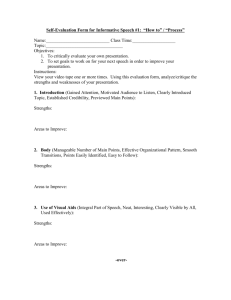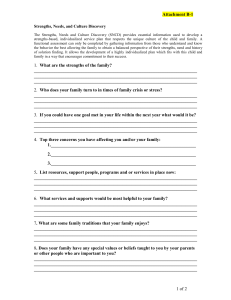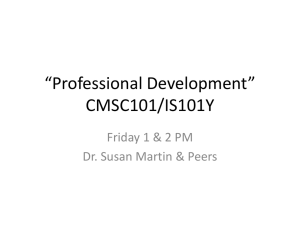JASPA 2010 - Saint Louis University
advertisement
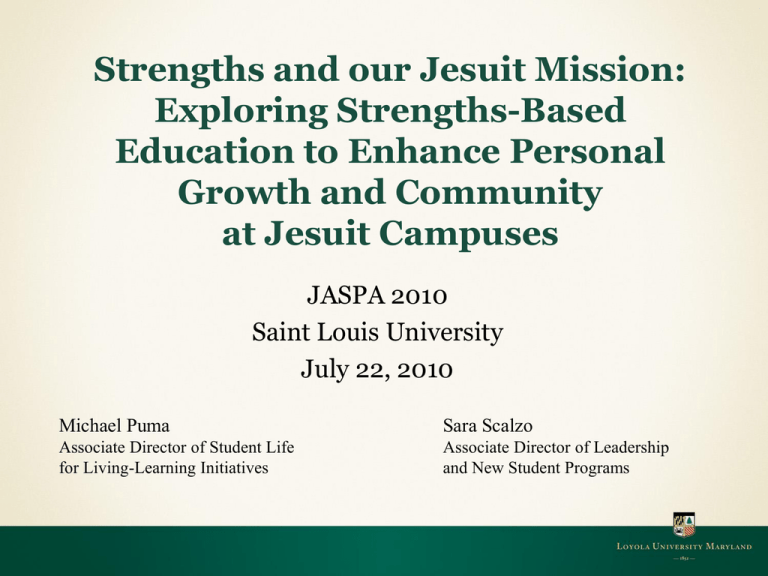
Strengths and our Jesuit Mission: Exploring Strengths-Based Education to Enhance Personal Growth and Community at Jesuit Campuses JASPA 2010 Saint Louis University July 22, 2010 Michael Puma Sara Scalzo Associate Director of Student Life for Living-Learning Initiatives Associate Director of Leadership and New Student Programs Learning Outcomes for Presentation Attendees will: Attendees will explore the intersection of Jesuit education and strengthsbased education through participating in a strengths-based reflection activity. Attendees will learn about the Clifton StrengthsFinder instrument and how to introduce the instrument to students, student staff and student leaders Attendees will learn about creative applications of the strengths-based program in different campus settings. Attendees will begin to process how they can apply strengths based education on their own campuses. Strengths Education at Loyola August 2006: Several administrators attend Gallup Organization’s StrengthsQuest Educators Seminar and Student Life Department incorporates StrengthsQuest into professional staff training May 2007: Loyola hosts StrengthsQuest Educators Seminar for 30 Student Development Administrators Fall 2007: StrengthsQuest incorporated into RA Training, Sophomore LivingLearning Community, and Sophomore Leadership Corps. Spring 2007: Plans for StrengthsQuest implementation expand to Student Staff in Campus Ministry, Center for Community Service and Justice , the Career Center Peer Educators and the First Year Orientation Program Coordinators. Fall 2008: Structured Strengths Curriculum for Student Life Staff Supervision developed and implemented; Leadership Living-Learning Community Developed Spring 2010 – Individualized Strengths meetings offered to students StrengthsQuest: The Writing Challenge How would go about improving your penmanship? Strengths Basics “A strength is the ability to provide consistent, near-perfect performance in a given activity.” “Just as finished diamonds start as diamonds in the rough, strengths begin with talents. And just as rough diamonds are naturally found in the earth, talents are naturally found within you. But while diamonds are refined with blades and polishing wheels, strengths are produced when talents are refined with knowledge and skill.” The Strengths process includes discovery, development & application Based in the study of positive psychology Clifton, Anderson & Schreiner, 2006 StrengthsQuest “It is ok to do what you want to do, until you discover what you were meant to do” - From The Rookie S=T+S+K Strength = Talent + Skill + Knowledge Strength: the ability to provide consistent, near-perfect performance in a specific activity. The 34 Signature Themes Executing Themes Influencing Themes Relationship Building Strategic Thinking Achiever Arranger Belief Consistency Deliberative Discipline Focus Responsibility Restorative Activator Command Communication Competition Maximizer Self-Assurance Significance Woo Adaptability Developer Connectedness Empathy Harmony Includer Individualization Positivity Relator Analytical Context Futuristic Ideation Input Intellection Learner Strategic Positive Psychology and our Jesuit Mission Positive Psychology assumes that “happiness success” is the most important goal in life The pleasant life – maximizing pleasure The good life – personally fulfilling activities & exercising personal strengths The meaningful Life – serving something larger than oneself Mather, 2010 MAGIS DISCOVERY * DEVELOPMENT * APPLICATION Five Traits of a Jesuit Education (Mitchell, 1988) A passion for quality Study of Humanities & Sciences Preoccupation with Questions of Ethics & Values Importance it gives to the religious experiences Person-Centered “Developing and applying our God-given strengths, gifts and talents under the Lordship of Christ is motivating because it is a joyous and fulfilling process and experience. This is also the process that leads to true excellence.” – Anderson, 2001 Strengths and the Examen How have I used my Signature Themes today? How are my Themes leading me to becoming my best self? How are my Signature Themes preventing me from becoming my best self? How do I need to recommit myself to using Strengths to the best of my ability? Discovery: Strengths and the Ad Infinitum Sophomore Community As a result of participating in the Ad Infinitum Community, students will…… Strengths Identify their top five signature themes utilizing the Gallup Organization’s StrengthsFinder online assessment tool Utilize their strengths to inform decisions made during their sophomore year Community Establish healthy and mutually beneficial relationships with others in the Ad Infinitum Community Reflection Employ self-reflection to gain insight regarding decision-making Discovery: Strengths and the Ad Infinitum Sophomore Community Spring – Students Take Assessment August – Introduction to Strengths September – Strengths and relationships October – Strengths and Academics November – Strengths and discernment/reflections January – Strengths – reviewing the fall February – Strengths and personal goals/vocational discernment March – Strengths and Career Exploration April – Strengths and Future Action Plans Discovery: Strengths and the Ad Infinitum Sophomore Community “StrengthsQuest provides you with a clearer perspective of yourself, allows you to recognize your strengths, and gives you advice on improving those strengths. It has been useful in my classes and getting along with everyone on the floor. “ “StrengthsQuest has truly helped me as a sophomore because I have become more positive towards myself and towards others because I understand that we all have different forms of thinking and my priorities are different from other people's. Therefore, knowing this I can accept people and be more understanding about why they act in certain ways. I have also been able to adapt my own strengths to school work, and thrive off my strongest ones to get more work done.” Development: The Sophomore Leadership Corps Student Leadership Corps Vision Statement: The Student Leadership Corps (SLC) is a group of sophomore students who have come together to further improve their individual and collective leadership skills through examination, open communication, and trust. SLC members will develop a deeper knowledge of themselves as persons and as value-driven leaders while at the same time examining theoretical concepts of leadership A glimpse into the program: Overnight retreat – introduce StrengthsQuest, Jesuit mission, leadership theory, and allow time for group bonding Weekly skill-building workshops – highlights include diversity, balance/stress management, decision making, marketing leadership skills Individual mentoring – offered throughout the entire year Encourage students to think about Strengths throughout program, especially how Strengths will help as they apply for leadership roles on campus Development: The Sophomore Leadership Corps Thoughts from participants: “My favorite part of StrenghtsQuest was learning about my Top 5 Strengths and realizing how true they were. Essentially, SQ helped me put into words the qualities that I knew I had and enabled me to understand their value as well as their potential disadvantages.” “Strengths helped me on my leadership journey because by being aware of my Top 5, I was able to learn the areas I could excel at and that were best fitted for me.” Amanda, Class of 2012 Jennifer, Class of 2011 “I think in general the mission of StrengthsQuest has helped me to understand what strategies I should use when working with others. As a student leader who has encountered a great deal of adversity, I appreciate StrengthsQuest because I know that even in the most difficult situations I have tools that will help me overcome and succeed.” Erin, Class of 2011 Application: Student Life Strengths Supervision RAs participating in the Strengths Curriculum will: Articulate in detail their own top 5 Strengths Integrate the results of StrengthsFinder with their self-perception of their abilities and tendencies Articulate the major Strengths of their peer staff members and supervisor(s) Formulate strategies to employ their Strengths in order to solve problems and improve performance Apply their understanding of Strengths to roles outside of the RA position Application: Student Life Strengths Supervision Components Integrated throughout fall training Strengths Letter Monthly staff activities Included in evaluation process and individualized action plan Provides supervisors with structured tools to: Improve individualized supervision Strengthen group dynamics Facilitate peer recognition Provide opportunities for feedback and evaluation Individualized Supervision Words from RAs Recognition and Feedback Words from RAs Tips for Introducing the Strengths Philosophy to Your Campus Start small – do strengths with your professional staff and allow some time for people to get used to the strengths philosophy. Examine your own strengths in relation to how you work with others It is best to offer experiential exercises when training supervisors & student leaders Have student staff and supervisors complete the assessment before introducing the 34 signature themes so that their assessment is not skewed. Supervisors need to be able to articulate their own strengths before they can work with their student staff. Tips for Introducing the Strengths Philosophy to Your Campus Share with colleagues across the campus so that you will start to create a Strengths culture and a common language for student development. Allow students the freedom to disagree with the signature theme report. If the students feel another Signature Theme best describes them, let them own it. Strengths supervision is not intended to take the place of constructive criticism. It should also not be used to justify inappropriate behavior and/or poor job performance. Strengths implementation should be integrated into all facets of your program – it is the only way to insure that you will meet your learning outcomes Intentionally show how strengths link back to the Jesuit mission. For more information and materials, contact Sara Scalzo sscalzo@loyola.edu 410-617-5570 Michael Puma mpuma@loyola.edu 410-617-2339
